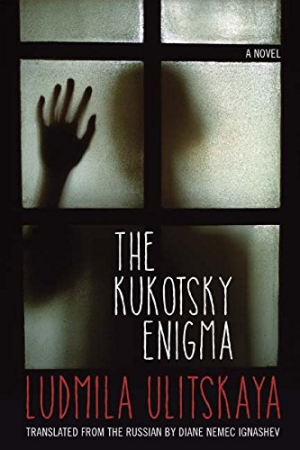The Kukotsky Enigma
This novel is a masterful portrait of individuals who find solace where they can, and who endure through personal disillusionment.
Ludmila Ulitskaya’s The Kukotsky Enigma is a generational saga and a defiant exploration of memory, medicine, ethics, mysticism, and love that tracks the fate of Pavel Alekseevich Kukotsky and his family, from the Stalinist era through to modern times.
Pavel is a gynecologist who witnesses the damage caused by illegal abortions. In his attempt to remedy the issue, he alienates his wife, Elena, and their household servant, Vasilisa, who find the idea immoral. After a horrific house call changes the family’s dynamics, Pavel descends into alcoholism, while his stepdaughter, Tanya, and the orphaned ward who shares their home, Toma, grow apart. When the lives of the Kukotsky clan intersect with the Goldbergs’, whose patriarch is a dissident geneticist, a tragic spiral is set in motion that pulls larger themes of destiny, birth, heredity, rebellion, and freedom together. Jagged, experimental turns—including diary entries from Elena, whose memory is failing, and one lengthy section set in a purgatorial desert—complicate the plot.
Out of difficult material, smaller moments stand out: a single, misspoken retort in the heat of an argument sunders a marriage. Sisterhood is cemented during a fearful moment in a crowd. A love for botany awakens in a young woman whom no one expected much of, and a favored daughter veers from an intellectual life after a routine request at work alters her view of the sciences.
Ulitskaya exposes sudden shifts in relationships and fortunes without intense dramatic buildup, and without lengthy introspection afterward. This lean approach, which favors events over character, makes the work all the more revealing, as though the pressures of Soviet life can not permit the luxury of lingering. Men and women must simply continue to play the hands they’ve been dealt.
If there is a sense of inevitability in the novel, there is also hope. However flawed it is, love sustains Pavel and Elena through decades of silence. Even a vision of the afterlife contains redemptive features, as bodies are revived and remade. At its core, this novel is a masterful portrait of individuals who find solace where they can, and who endure through personal disillusionment with the strength that only the pragmatic can find.
Reviewed by
Karen Rigby
Disclosure: This article is not an endorsement, but a review. The publisher of this book provided free copies of the book to have their book reviewed by a professional reviewer. No fee was paid by the publisher for this review. Foreword Reviews only recommends books that we love. Foreword Magazine, Inc. is disclosing this in accordance with the Federal Trade Commission’s 16 CFR, Part 255.

